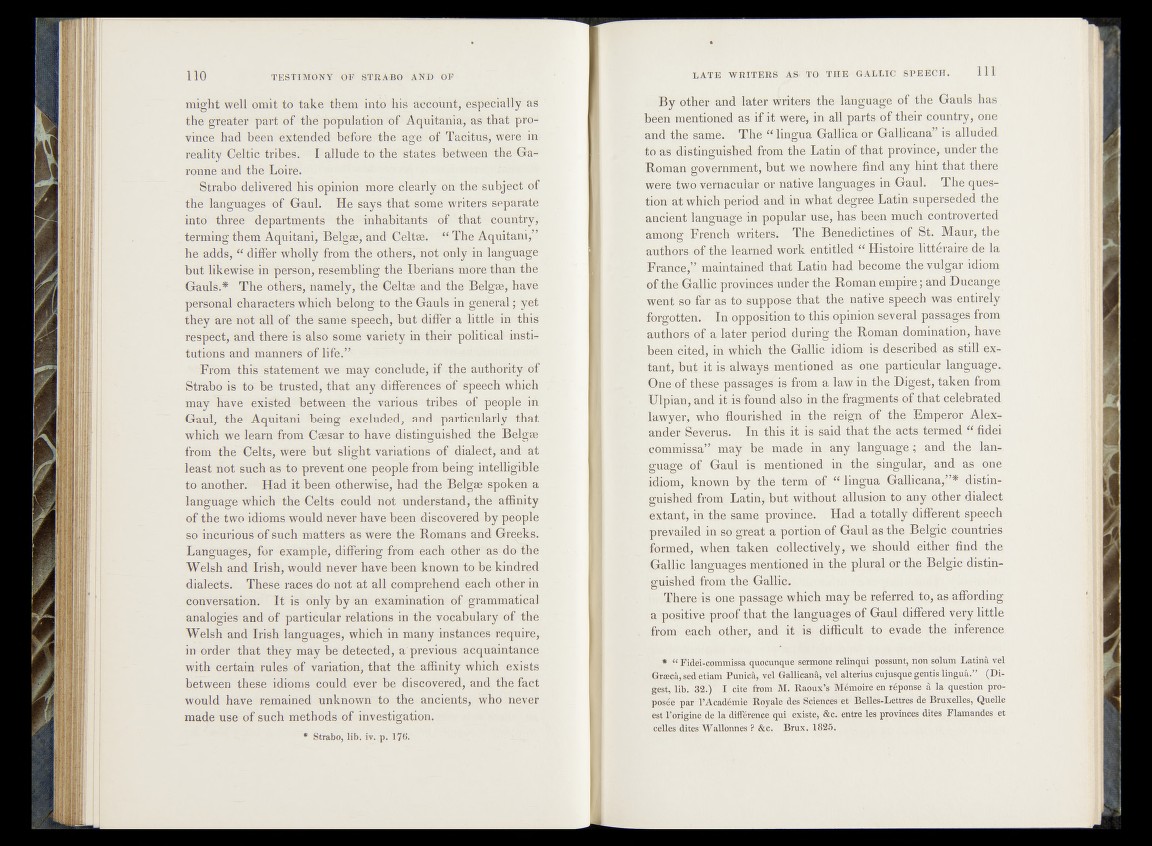
might well omit to take them into his account* especially as
the greater part of the population of Aquitania, as that province
had been; extended before, the age of Taoit-us, were in
reality Cel tie tribes. I allude to the states between the Ga->
ronne and the Loire. '
Strabo delivered his opinion more clearly on the subject of
the languages of Gaul. He says that some writers separate
into three departments the inhabitants of that country/
terming them Aquitani, Belgse, and Celt®. “ The Aquitani,”
he adds, “ differ wholly from the others, not only in language
but likewise in person, resembling the Iberians more than the
Gauls.* The others, namely, the Celtse and the Belgse, have
personal characters which belong to the Gauls in general; yet
they are not all of the same; speech, but differ a little in this
respect, and there is also some variety in their political'- instil
tutions and manners of life.”
From this statement we may concludej if the authority of
Strabo is to be trusted, that any differences of "speech which
may have existed between the various tribes of people in
Gaul, the Aquitani being excluded, and particularly that
which We learn from Csesar to have distinguished the Belgse
from the Celts, were but slight variations of dialect; and at
least not such as to prevent one people from being'intelligible
to another. Had it been otherwise, had the Belgse spoken a
language which the Celts could not understand, the affinity
of the two idiomsjwould-never have been discovered =by people
so incurious of such matters as were the Romans and Greeks;
Languages, for example, differing from each other as do the
Welsh and Irish, would never have been known to: be kindred
dialects. These races do not at all comprehend each other in
conversation. I t is only by an examination of • grammatical
analogies and of particular relations in the vocabulary of the
Welsh and Irish languages, which in many instances require,
in order that they may be detected, a previous acquaintance
with certain rules of variation, that th e affinity which exists
between these idioms could ever be discovered, and the fact
would have remained unknown to the ancients, who never
made use of such methods of investigation.
• Strabo, lib. iv. p. 176.
By other and later writers the language of the Gauls has
been mentioned as if it were, in all parts of their country, one
and the same. The ‘fdingua Gallica or Gallicans?7 is alluded
to as distinguished from the Latin of that province, under the
Roman government, but-we nowhere find anyihint that there
Were 1|Wo vernacular ont Hâtive languagesçàn Gaub, The question
at which,periodr.and'|h what .degree Latin superseded the
ancient laiiguage'in.popular use, has bëenmuch controverted
among French writers'. ’Thfe. Bemo^fetines, of; St. Maur, Jh#
authors, of-the learned'work entitled/“ Histoire#tf,éràire de la
France,’.’ maintained, that Latin had become thg vulgar idiom
of the Gallic provinces* under the Roman C^Jp^fe^nd Rucajnge
swenf fsb-far-as to supposevthat the native speech wasje^ljrely
.forgotten. In opposition tothis ©pinion several pàss^e^ifrom
authors of a/,later>per|dri|cl-ufing.\the Roman domination, have
/been cited, in which the Gallic idiom is described.!, as still ex-,
tant, b u t,itàs^lways mentioned/fas. onp,particular language..
On©’©£ these-pàssag^/is from a law in; the Lfeg^t, taken from
Hdl pian,.and itiisil^und also in,the fragments ofothât’cefebrated,
lawyer* w tó flourished in the rcign iqf the Empefj^n jAlex-
anderiSejverus-b In this it is fed?that the aet^teffoed “ffi,dei
commissa” may* b,e%made in any language; and the,Jan-.
,;guage of Gaul is mentioned "in the éipgular, and as, .Qne
iLdjom, v.lünown by jthe term of “ lingnai Gallicana,” * idistin-
'f^ishedjfrorn Latinj hut without allusfon to any other*dialept
extant, in the same* province. Had a totally different speech
prevailed in so'great a portion of Gaul as the Belgic: countries
formed, when taken ^collectively, we^^toidd either?jfii|^i the,
Gallic languages mentioned in the plural or the Belgic distinguished
from the Gallic.
There is one passage which may be referredidp^jas affording,
a »positive proof that; the languages o f Gaul differed Very little
from each other,, and it is difficult .to evade inference,
* “ Fidei-commissa quocunque sermone jrelfnqui poffunt,yD^ |pIun^j|^,tina y el
Græcâ, sed etiam Punicâ, vel Gallicanà, yebalterius cujusquê gent is lingua.” . (Di-
gest, lit)'. 32.)* I cite from M. Raoux’s Mémoire en réponse à la -Question prop
o s e par l’Académie Royale des Sciences et- Belles-Lettres de Bïnîxelles, Quelle
est l ’origine de la différence qui existe, dtc., entre les provinces dites Flamandes et
celles dites'Wallonnes ? &c, Brux. 1825.